HND Unit 29: Managing and Planning an Event Report
VerifiedAdded on 2023/01/12
|10
|3354
|49
Report
AI Summary
This report delves into the multifaceted world of event management, covering the key aspects of planning and execution. It begins by exploring market and customer research methods, emphasizing their role in shaping event plans. The report then outlines the essential principles for developing event plans that align with customer needs, alongside a detailed examination of event policies and procedures. It identifies the resources required to deliver a successful event and highlights the crucial management skills necessary for effective event coordination. Finally, the report discusses methods for monitoring event success, analyzing variances, and making recommendations for improvement, providing a comprehensive guide to the event management process, all based on a scenario for Dream Sales Machine Ltd, a medium sized event company. This report is contributed by a student to be published on the website Desklib, a platform which provides all the necessary AI based study tools for students.
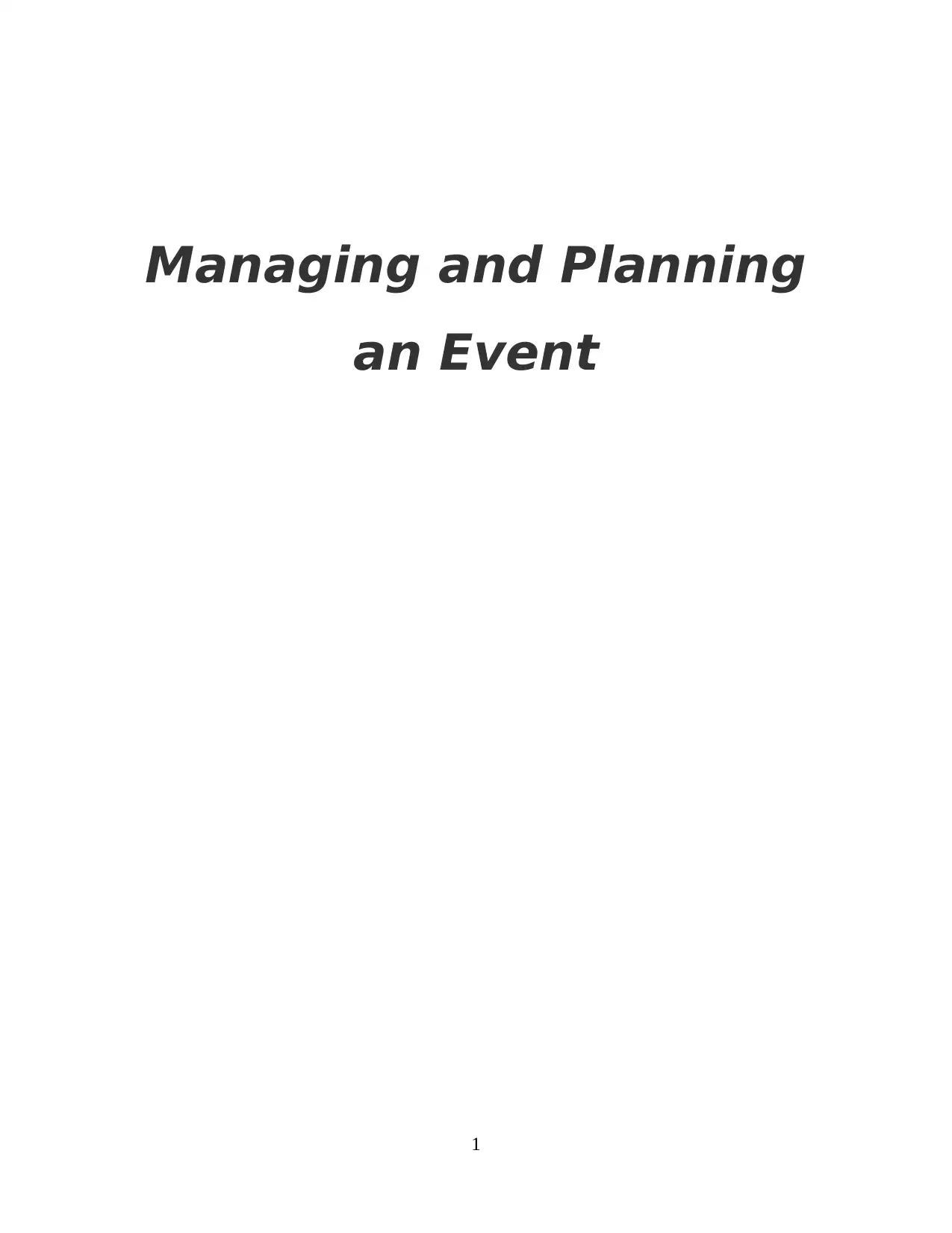
Managing and Planning
an Event
1
an Event
1
Paraphrase This Document
Need a fresh take? Get an instant paraphrase of this document with our AI Paraphraser
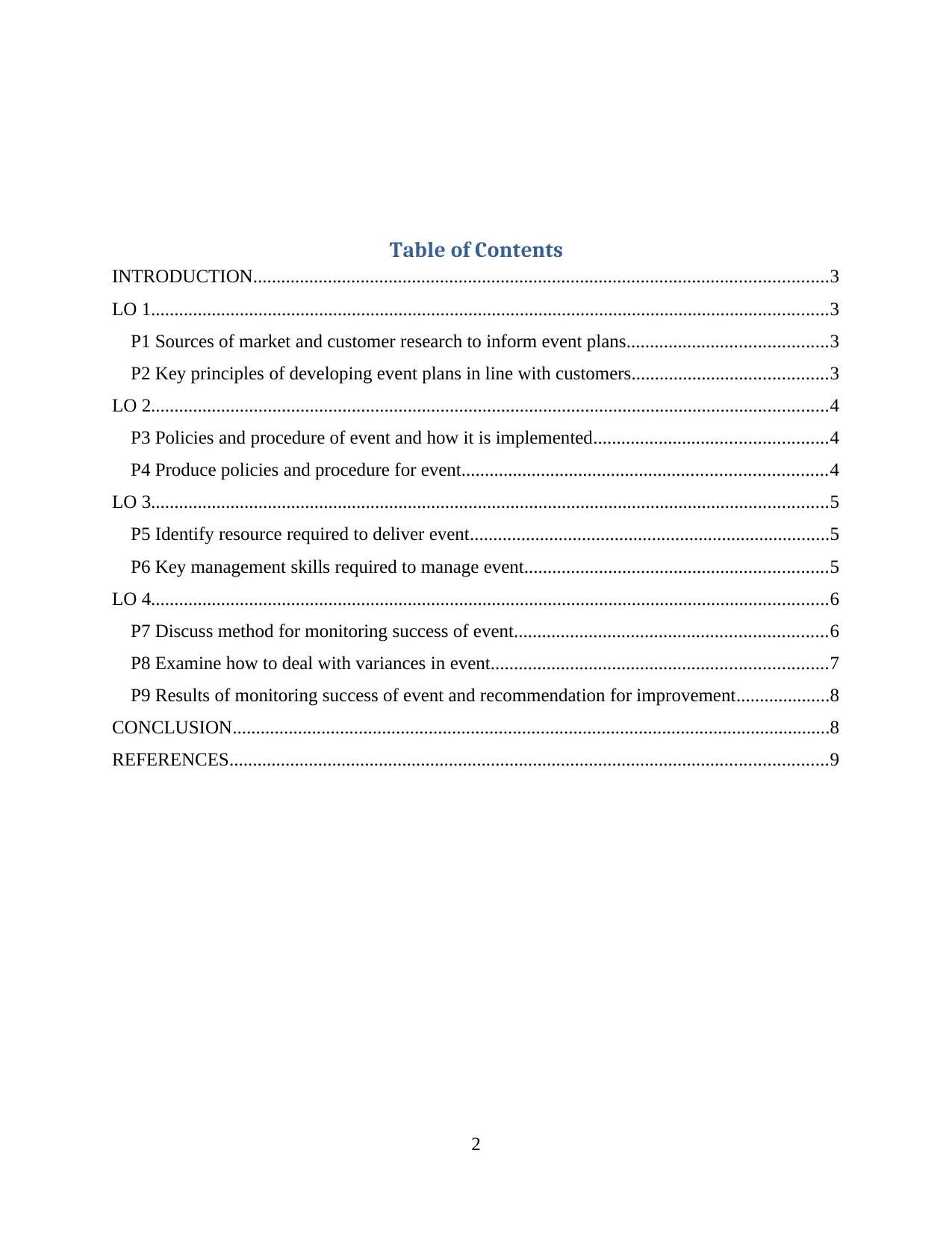
Table of Contents
INTRODUCTION...........................................................................................................................3
LO 1.................................................................................................................................................3
P1 Sources of market and customer research to inform event plans...........................................3
P2 Key principles of developing event plans in line with customers..........................................3
LO 2.................................................................................................................................................4
P3 Policies and procedure of event and how it is implemented..................................................4
P4 Produce policies and procedure for event..............................................................................4
LO 3.................................................................................................................................................5
P5 Identify resource required to deliver event.............................................................................5
P6 Key management skills required to manage event.................................................................5
LO 4.................................................................................................................................................6
P7 Discuss method for monitoring success of event...................................................................6
P8 Examine how to deal with variances in event........................................................................7
P9 Results of monitoring success of event and recommendation for improvement....................8
CONCLUSION................................................................................................................................8
REFERENCES................................................................................................................................9
2
INTRODUCTION...........................................................................................................................3
LO 1.................................................................................................................................................3
P1 Sources of market and customer research to inform event plans...........................................3
P2 Key principles of developing event plans in line with customers..........................................3
LO 2.................................................................................................................................................4
P3 Policies and procedure of event and how it is implemented..................................................4
P4 Produce policies and procedure for event..............................................................................4
LO 3.................................................................................................................................................5
P5 Identify resource required to deliver event.............................................................................5
P6 Key management skills required to manage event.................................................................5
LO 4.................................................................................................................................................6
P7 Discuss method for monitoring success of event...................................................................6
P8 Examine how to deal with variances in event........................................................................7
P9 Results of monitoring success of event and recommendation for improvement....................8
CONCLUSION................................................................................................................................8
REFERENCES................................................................................................................................9
2
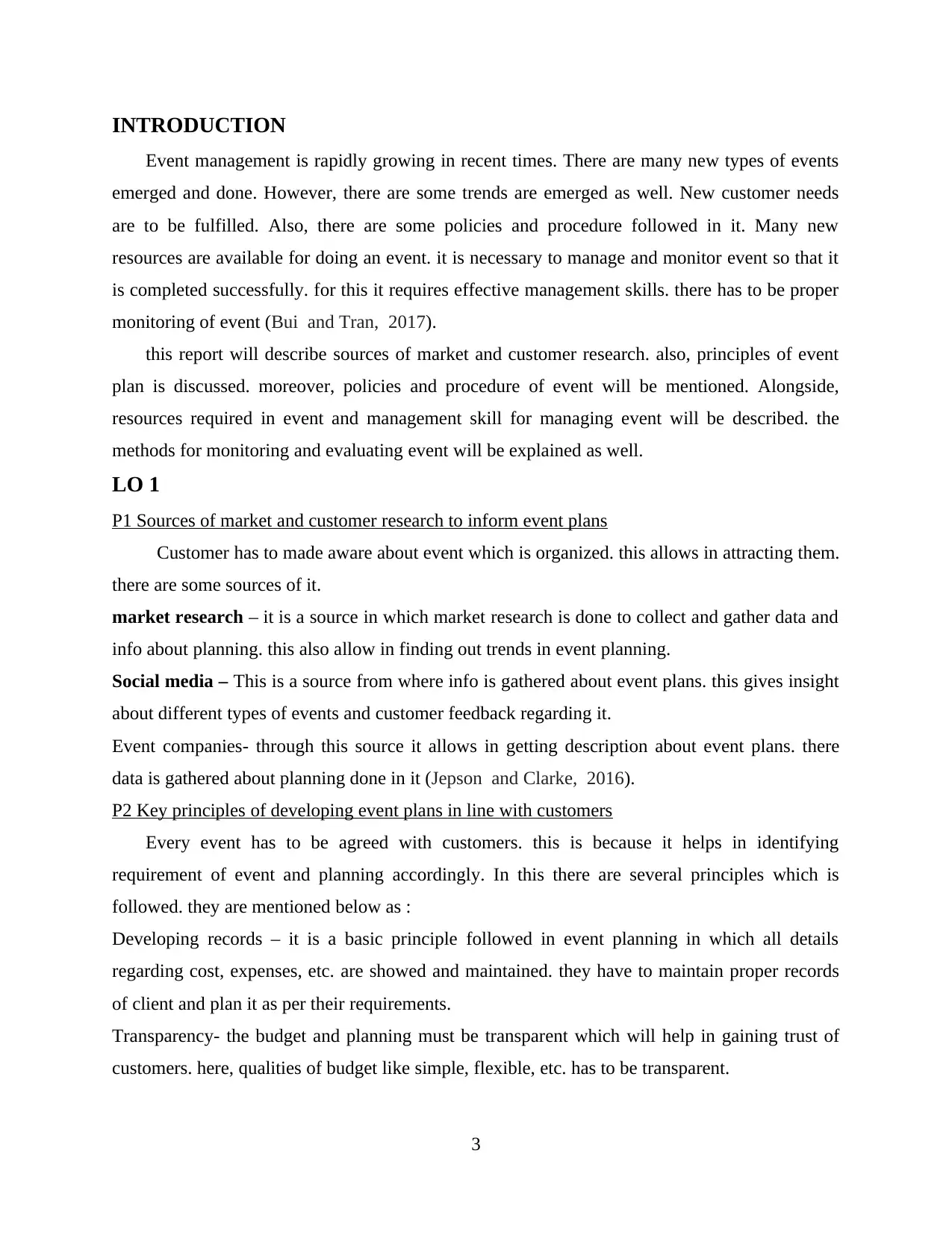
INTRODUCTION
Event management is rapidly growing in recent times. There are many new types of events
emerged and done. However, there are some trends are emerged as well. New customer needs
are to be fulfilled. Also, there are some policies and procedure followed in it. Many new
resources are available for doing an event. it is necessary to manage and monitor event so that it
is completed successfully. for this it requires effective management skills. there has to be proper
monitoring of event (Bui and Tran, 2017).
this report will describe sources of market and customer research. also, principles of event
plan is discussed. moreover, policies and procedure of event will be mentioned. Alongside,
resources required in event and management skill for managing event will be described. the
methods for monitoring and evaluating event will be explained as well.
LO 1
P1 Sources of market and customer research to inform event plans
Customer has to made aware about event which is organized. this allows in attracting them.
there are some sources of it.
market research – it is a source in which market research is done to collect and gather data and
info about planning. this also allow in finding out trends in event planning.
Social media – This is a source from where info is gathered about event plans. this gives insight
about different types of events and customer feedback regarding it.
Event companies- through this source it allows in getting description about event plans. there
data is gathered about planning done in it (Jepson and Clarke, 2016).
P2 Key principles of developing event plans in line with customers
Every event has to be agreed with customers. this is because it helps in identifying
requirement of event and planning accordingly. In this there are several principles which is
followed. they are mentioned below as :
Developing records – it is a basic principle followed in event planning in which all details
regarding cost, expenses, etc. are showed and maintained. they have to maintain proper records
of client and plan it as per their requirements.
Transparency- the budget and planning must be transparent which will help in gaining trust of
customers. here, qualities of budget like simple, flexible, etc. has to be transparent.
3
Event management is rapidly growing in recent times. There are many new types of events
emerged and done. However, there are some trends are emerged as well. New customer needs
are to be fulfilled. Also, there are some policies and procedure followed in it. Many new
resources are available for doing an event. it is necessary to manage and monitor event so that it
is completed successfully. for this it requires effective management skills. there has to be proper
monitoring of event (Bui and Tran, 2017).
this report will describe sources of market and customer research. also, principles of event
plan is discussed. moreover, policies and procedure of event will be mentioned. Alongside,
resources required in event and management skill for managing event will be described. the
methods for monitoring and evaluating event will be explained as well.
LO 1
P1 Sources of market and customer research to inform event plans
Customer has to made aware about event which is organized. this allows in attracting them.
there are some sources of it.
market research – it is a source in which market research is done to collect and gather data and
info about planning. this also allow in finding out trends in event planning.
Social media – This is a source from where info is gathered about event plans. this gives insight
about different types of events and customer feedback regarding it.
Event companies- through this source it allows in getting description about event plans. there
data is gathered about planning done in it (Jepson and Clarke, 2016).
P2 Key principles of developing event plans in line with customers
Every event has to be agreed with customers. this is because it helps in identifying
requirement of event and planning accordingly. In this there are several principles which is
followed. they are mentioned below as :
Developing records – it is a basic principle followed in event planning in which all details
regarding cost, expenses, etc. are showed and maintained. they have to maintain proper records
of client and plan it as per their requirements.
Transparency- the budget and planning must be transparent which will help in gaining trust of
customers. here, qualities of budget like simple, flexible, etc. has to be transparent.
3
⊘ This is a preview!⊘
Do you want full access?
Subscribe today to unlock all pages.

Trusted by 1+ million students worldwide
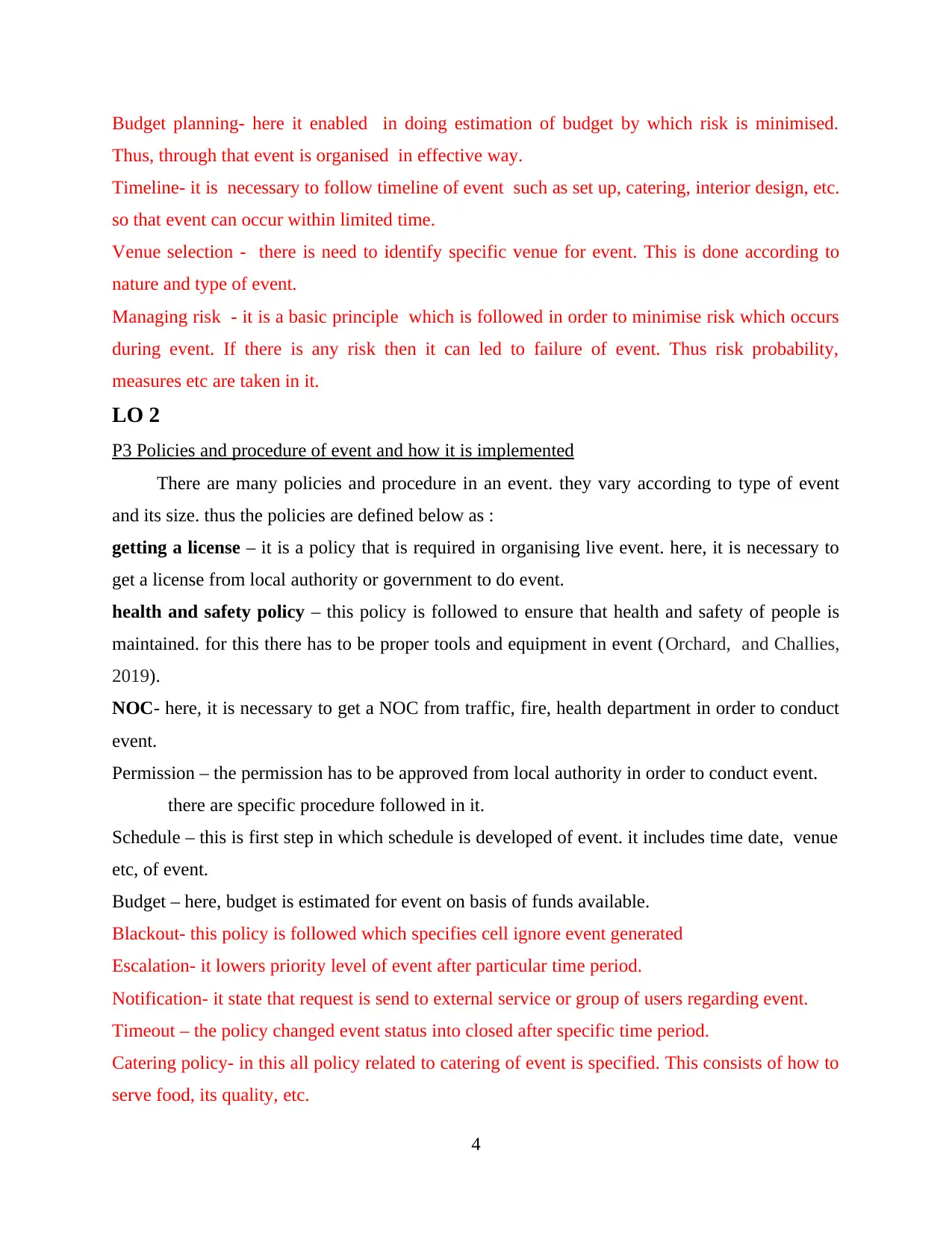
Budget planning- here it enabled in doing estimation of budget by which risk is minimised.
Thus, through that event is organised in effective way.
Timeline- it is necessary to follow timeline of event such as set up, catering, interior design, etc.
so that event can occur within limited time.
Venue selection - there is need to identify specific venue for event. This is done according to
nature and type of event.
Managing risk - it is a basic principle which is followed in order to minimise risk which occurs
during event. If there is any risk then it can led to failure of event. Thus risk probability,
measures etc are taken in it.
LO 2
P3 Policies and procedure of event and how it is implemented
There are many policies and procedure in an event. they vary according to type of event
and its size. thus the policies are defined below as :
getting a license – it is a policy that is required in organising live event. here, it is necessary to
get a license from local authority or government to do event.
health and safety policy – this policy is followed to ensure that health and safety of people is
maintained. for this there has to be proper tools and equipment in event (Orchard, and Challies,
2019).
NOC- here, it is necessary to get a NOC from traffic, fire, health department in order to conduct
event.
Permission – the permission has to be approved from local authority in order to conduct event.
there are specific procedure followed in it.
Schedule – this is first step in which schedule is developed of event. it includes time date, venue
etc, of event.
Budget – here, budget is estimated for event on basis of funds available.
Blackout- this policy is followed which specifies cell ignore event generated
Escalation- it lowers priority level of event after particular time period.
Notification- it state that request is send to external service or group of users regarding event.
Timeout – the policy changed event status into closed after specific time period.
Catering policy- in this all policy related to catering of event is specified. This consists of how to
serve food, its quality, etc.
4
Thus, through that event is organised in effective way.
Timeline- it is necessary to follow timeline of event such as set up, catering, interior design, etc.
so that event can occur within limited time.
Venue selection - there is need to identify specific venue for event. This is done according to
nature and type of event.
Managing risk - it is a basic principle which is followed in order to minimise risk which occurs
during event. If there is any risk then it can led to failure of event. Thus risk probability,
measures etc are taken in it.
LO 2
P3 Policies and procedure of event and how it is implemented
There are many policies and procedure in an event. they vary according to type of event
and its size. thus the policies are defined below as :
getting a license – it is a policy that is required in organising live event. here, it is necessary to
get a license from local authority or government to do event.
health and safety policy – this policy is followed to ensure that health and safety of people is
maintained. for this there has to be proper tools and equipment in event (Orchard, and Challies,
2019).
NOC- here, it is necessary to get a NOC from traffic, fire, health department in order to conduct
event.
Permission – the permission has to be approved from local authority in order to conduct event.
there are specific procedure followed in it.
Schedule – this is first step in which schedule is developed of event. it includes time date, venue
etc, of event.
Budget – here, budget is estimated for event on basis of funds available.
Blackout- this policy is followed which specifies cell ignore event generated
Escalation- it lowers priority level of event after particular time period.
Notification- it state that request is send to external service or group of users regarding event.
Timeout – the policy changed event status into closed after specific time period.
Catering policy- in this all policy related to catering of event is specified. This consists of how to
serve food, its quality, etc.
4
Paraphrase This Document
Need a fresh take? Get an instant paraphrase of this document with our AI Paraphraser
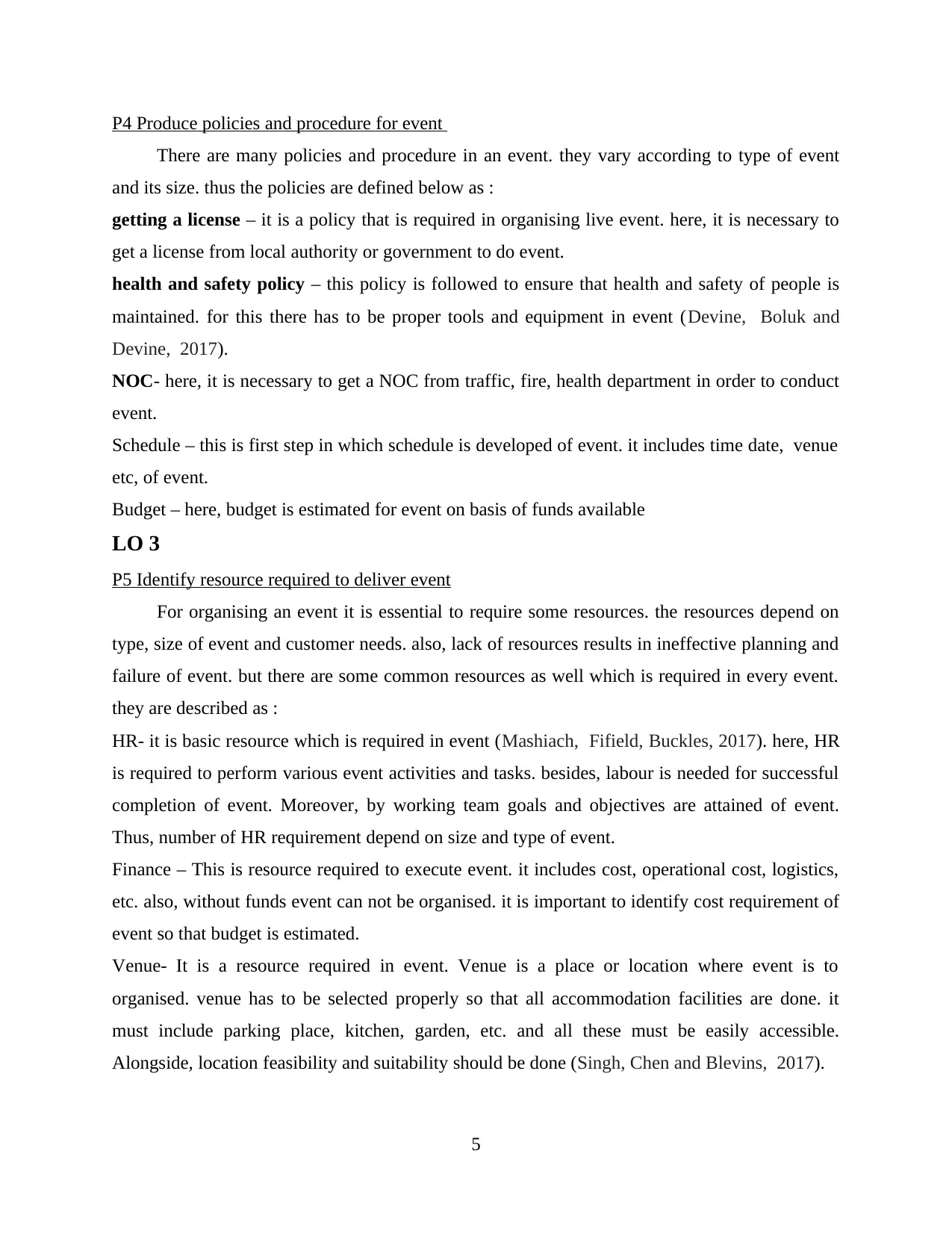
P4 Produce policies and procedure for event
There are many policies and procedure in an event. they vary according to type of event
and its size. thus the policies are defined below as :
getting a license – it is a policy that is required in organising live event. here, it is necessary to
get a license from local authority or government to do event.
health and safety policy – this policy is followed to ensure that health and safety of people is
maintained. for this there has to be proper tools and equipment in event (Devine, Boluk and
Devine, 2017).
NOC- here, it is necessary to get a NOC from traffic, fire, health department in order to conduct
event.
Schedule – this is first step in which schedule is developed of event. it includes time date, venue
etc, of event.
Budget – here, budget is estimated for event on basis of funds available
LO 3
P5 Identify resource required to deliver event
For organising an event it is essential to require some resources. the resources depend on
type, size of event and customer needs. also, lack of resources results in ineffective planning and
failure of event. but there are some common resources as well which is required in every event.
they are described as :
HR- it is basic resource which is required in event (Mashiach, Fifield, Buckles, 2017). here, HR
is required to perform various event activities and tasks. besides, labour is needed for successful
completion of event. Moreover, by working team goals and objectives are attained of event.
Thus, number of HR requirement depend on size and type of event.
Finance – This is resource required to execute event. it includes cost, operational cost, logistics,
etc. also, without funds event can not be organised. it is important to identify cost requirement of
event so that budget is estimated.
Venue- It is a resource required in event. Venue is a place or location where event is to
organised. venue has to be selected properly so that all accommodation facilities are done. it
must include parking place, kitchen, garden, etc. and all these must be easily accessible.
Alongside, location feasibility and suitability should be done (Singh, Chen and Blevins, 2017).
5
There are many policies and procedure in an event. they vary according to type of event
and its size. thus the policies are defined below as :
getting a license – it is a policy that is required in organising live event. here, it is necessary to
get a license from local authority or government to do event.
health and safety policy – this policy is followed to ensure that health and safety of people is
maintained. for this there has to be proper tools and equipment in event (Devine, Boluk and
Devine, 2017).
NOC- here, it is necessary to get a NOC from traffic, fire, health department in order to conduct
event.
Schedule – this is first step in which schedule is developed of event. it includes time date, venue
etc, of event.
Budget – here, budget is estimated for event on basis of funds available
LO 3
P5 Identify resource required to deliver event
For organising an event it is essential to require some resources. the resources depend on
type, size of event and customer needs. also, lack of resources results in ineffective planning and
failure of event. but there are some common resources as well which is required in every event.
they are described as :
HR- it is basic resource which is required in event (Mashiach, Fifield, Buckles, 2017). here, HR
is required to perform various event activities and tasks. besides, labour is needed for successful
completion of event. Moreover, by working team goals and objectives are attained of event.
Thus, number of HR requirement depend on size and type of event.
Finance – This is resource required to execute event. it includes cost, operational cost, logistics,
etc. also, without funds event can not be organised. it is important to identify cost requirement of
event so that budget is estimated.
Venue- It is a resource required in event. Venue is a place or location where event is to
organised. venue has to be selected properly so that all accommodation facilities are done. it
must include parking place, kitchen, garden, etc. and all these must be easily accessible.
Alongside, location feasibility and suitability should be done (Singh, Chen and Blevins, 2017).
5
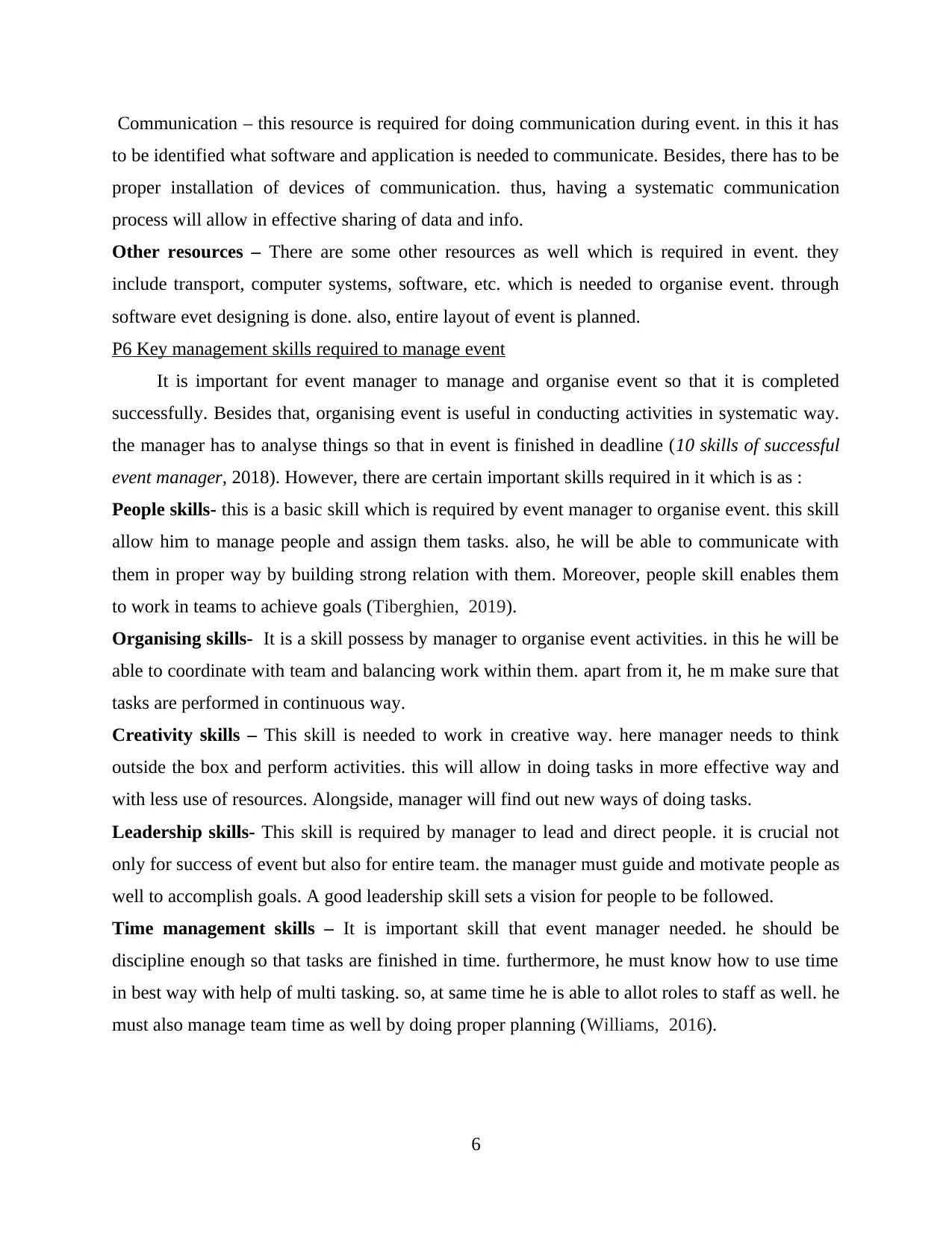
Communication – this resource is required for doing communication during event. in this it has
to be identified what software and application is needed to communicate. Besides, there has to be
proper installation of devices of communication. thus, having a systematic communication
process will allow in effective sharing of data and info.
Other resources – There are some other resources as well which is required in event. they
include transport, computer systems, software, etc. which is needed to organise event. through
software evet designing is done. also, entire layout of event is planned.
P6 Key management skills required to manage event
It is important for event manager to manage and organise event so that it is completed
successfully. Besides that, organising event is useful in conducting activities in systematic way.
the manager has to analyse things so that in event is finished in deadline (10 skills of successful
event manager, 2018). However, there are certain important skills required in it which is as :
People skills- this is a basic skill which is required by event manager to organise event. this skill
allow him to manage people and assign them tasks. also, he will be able to communicate with
them in proper way by building strong relation with them. Moreover, people skill enables them
to work in teams to achieve goals (Tiberghien, 2019).
Organising skills- It is a skill possess by manager to organise event activities. in this he will be
able to coordinate with team and balancing work within them. apart from it, he m make sure that
tasks are performed in continuous way.
Creativity skills – This skill is needed to work in creative way. here manager needs to think
outside the box and perform activities. this will allow in doing tasks in more effective way and
with less use of resources. Alongside, manager will find out new ways of doing tasks.
Leadership skills- This skill is required by manager to lead and direct people. it is crucial not
only for success of event but also for entire team. the manager must guide and motivate people as
well to accomplish goals. A good leadership skill sets a vision for people to be followed.
Time management skills – It is important skill that event manager needed. he should be
discipline enough so that tasks are finished in time. furthermore, he must know how to use time
in best way with help of multi tasking. so, at same time he is able to allot roles to staff as well. he
must also manage team time as well by doing proper planning (Williams, 2016).
6
to be identified what software and application is needed to communicate. Besides, there has to be
proper installation of devices of communication. thus, having a systematic communication
process will allow in effective sharing of data and info.
Other resources – There are some other resources as well which is required in event. they
include transport, computer systems, software, etc. which is needed to organise event. through
software evet designing is done. also, entire layout of event is planned.
P6 Key management skills required to manage event
It is important for event manager to manage and organise event so that it is completed
successfully. Besides that, organising event is useful in conducting activities in systematic way.
the manager has to analyse things so that in event is finished in deadline (10 skills of successful
event manager, 2018). However, there are certain important skills required in it which is as :
People skills- this is a basic skill which is required by event manager to organise event. this skill
allow him to manage people and assign them tasks. also, he will be able to communicate with
them in proper way by building strong relation with them. Moreover, people skill enables them
to work in teams to achieve goals (Tiberghien, 2019).
Organising skills- It is a skill possess by manager to organise event activities. in this he will be
able to coordinate with team and balancing work within them. apart from it, he m make sure that
tasks are performed in continuous way.
Creativity skills – This skill is needed to work in creative way. here manager needs to think
outside the box and perform activities. this will allow in doing tasks in more effective way and
with less use of resources. Alongside, manager will find out new ways of doing tasks.
Leadership skills- This skill is required by manager to lead and direct people. it is crucial not
only for success of event but also for entire team. the manager must guide and motivate people as
well to accomplish goals. A good leadership skill sets a vision for people to be followed.
Time management skills – It is important skill that event manager needed. he should be
discipline enough so that tasks are finished in time. furthermore, he must know how to use time
in best way with help of multi tasking. so, at same time he is able to allot roles to staff as well. he
must also manage team time as well by doing proper planning (Williams, 2016).
6
⊘ This is a preview!⊘
Do you want full access?
Subscribe today to unlock all pages.

Trusted by 1+ million students worldwide
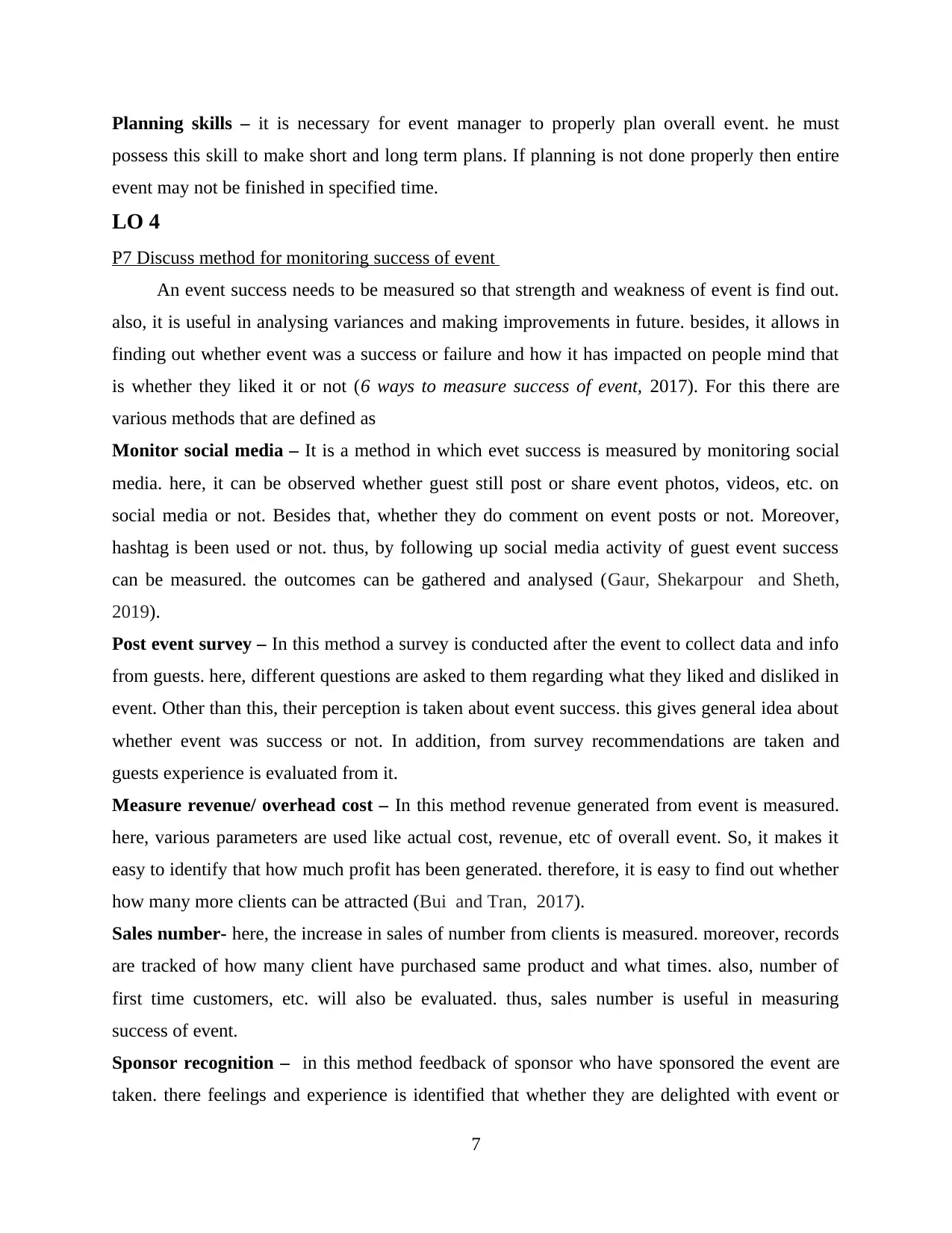
Planning skills – it is necessary for event manager to properly plan overall event. he must
possess this skill to make short and long term plans. If planning is not done properly then entire
event may not be finished in specified time.
LO 4
P7 Discuss method for monitoring success of event
An event success needs to be measured so that strength and weakness of event is find out.
also, it is useful in analysing variances and making improvements in future. besides, it allows in
finding out whether event was a success or failure and how it has impacted on people mind that
is whether they liked it or not (6 ways to measure success of event, 2017). For this there are
various methods that are defined as
Monitor social media – It is a method in which evet success is measured by monitoring social
media. here, it can be observed whether guest still post or share event photos, videos, etc. on
social media or not. Besides that, whether they do comment on event posts or not. Moreover,
hashtag is been used or not. thus, by following up social media activity of guest event success
can be measured. the outcomes can be gathered and analysed (Gaur, Shekarpour and Sheth,
2019).
Post event survey – In this method a survey is conducted after the event to collect data and info
from guests. here, different questions are asked to them regarding what they liked and disliked in
event. Other than this, their perception is taken about event success. this gives general idea about
whether event was success or not. In addition, from survey recommendations are taken and
guests experience is evaluated from it.
Measure revenue/ overhead cost – In this method revenue generated from event is measured.
here, various parameters are used like actual cost, revenue, etc of overall event. So, it makes it
easy to identify that how much profit has been generated. therefore, it is easy to find out whether
how many more clients can be attracted (Bui and Tran, 2017).
Sales number- here, the increase in sales of number from clients is measured. moreover, records
are tracked of how many client have purchased same product and what times. also, number of
first time customers, etc. will also be evaluated. thus, sales number is useful in measuring
success of event.
Sponsor recognition – in this method feedback of sponsor who have sponsored the event are
taken. there feelings and experience is identified that whether they are delighted with event or
7
possess this skill to make short and long term plans. If planning is not done properly then entire
event may not be finished in specified time.
LO 4
P7 Discuss method for monitoring success of event
An event success needs to be measured so that strength and weakness of event is find out.
also, it is useful in analysing variances and making improvements in future. besides, it allows in
finding out whether event was a success or failure and how it has impacted on people mind that
is whether they liked it or not (6 ways to measure success of event, 2017). For this there are
various methods that are defined as
Monitor social media – It is a method in which evet success is measured by monitoring social
media. here, it can be observed whether guest still post or share event photos, videos, etc. on
social media or not. Besides that, whether they do comment on event posts or not. Moreover,
hashtag is been used or not. thus, by following up social media activity of guest event success
can be measured. the outcomes can be gathered and analysed (Gaur, Shekarpour and Sheth,
2019).
Post event survey – In this method a survey is conducted after the event to collect data and info
from guests. here, different questions are asked to them regarding what they liked and disliked in
event. Other than this, their perception is taken about event success. this gives general idea about
whether event was success or not. In addition, from survey recommendations are taken and
guests experience is evaluated from it.
Measure revenue/ overhead cost – In this method revenue generated from event is measured.
here, various parameters are used like actual cost, revenue, etc of overall event. So, it makes it
easy to identify that how much profit has been generated. therefore, it is easy to find out whether
how many more clients can be attracted (Bui and Tran, 2017).
Sales number- here, the increase in sales of number from clients is measured. moreover, records
are tracked of how many client have purchased same product and what times. also, number of
first time customers, etc. will also be evaluated. thus, sales number is useful in measuring
success of event.
Sponsor recognition – in this method feedback of sponsor who have sponsored the event are
taken. there feelings and experience is identified that whether they are delighted with event or
7
Paraphrase This Document
Need a fresh take? Get an instant paraphrase of this document with our AI Paraphraser
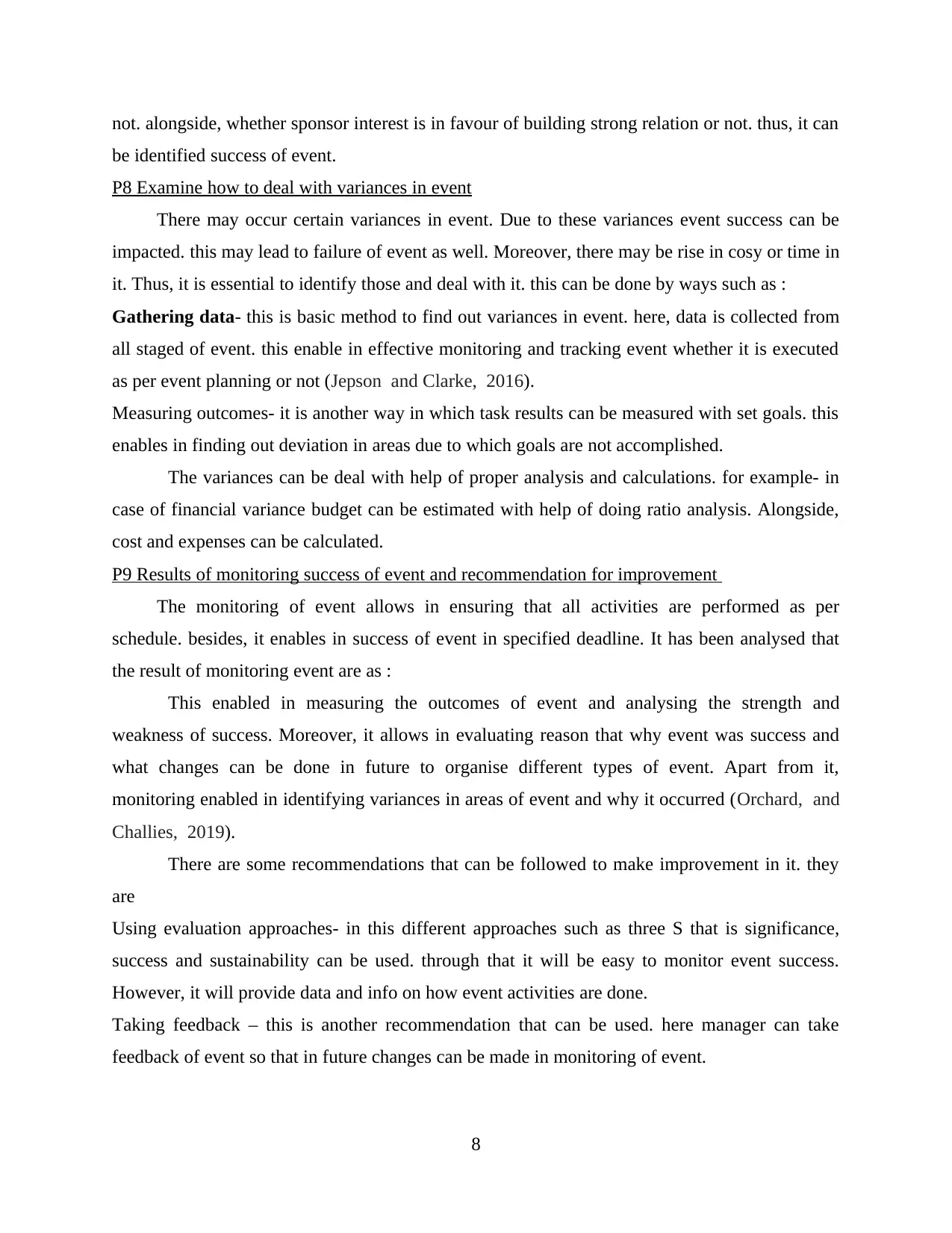
not. alongside, whether sponsor interest is in favour of building strong relation or not. thus, it can
be identified success of event.
P8 Examine how to deal with variances in event
There may occur certain variances in event. Due to these variances event success can be
impacted. this may lead to failure of event as well. Moreover, there may be rise in cosy or time in
it. Thus, it is essential to identify those and deal with it. this can be done by ways such as :
Gathering data- this is basic method to find out variances in event. here, data is collected from
all staged of event. this enable in effective monitoring and tracking event whether it is executed
as per event planning or not (Jepson and Clarke, 2016).
Measuring outcomes- it is another way in which task results can be measured with set goals. this
enables in finding out deviation in areas due to which goals are not accomplished.
The variances can be deal with help of proper analysis and calculations. for example- in
case of financial variance budget can be estimated with help of doing ratio analysis. Alongside,
cost and expenses can be calculated.
P9 Results of monitoring success of event and recommendation for improvement
The monitoring of event allows in ensuring that all activities are performed as per
schedule. besides, it enables in success of event in specified deadline. It has been analysed that
the result of monitoring event are as :
This enabled in measuring the outcomes of event and analysing the strength and
weakness of success. Moreover, it allows in evaluating reason that why event was success and
what changes can be done in future to organise different types of event. Apart from it,
monitoring enabled in identifying variances in areas of event and why it occurred (Orchard, and
Challies, 2019).
There are some recommendations that can be followed to make improvement in it. they
are
Using evaluation approaches- in this different approaches such as three S that is significance,
success and sustainability can be used. through that it will be easy to monitor event success.
However, it will provide data and info on how event activities are done.
Taking feedback – this is another recommendation that can be used. here manager can take
feedback of event so that in future changes can be made in monitoring of event.
8
be identified success of event.
P8 Examine how to deal with variances in event
There may occur certain variances in event. Due to these variances event success can be
impacted. this may lead to failure of event as well. Moreover, there may be rise in cosy or time in
it. Thus, it is essential to identify those and deal with it. this can be done by ways such as :
Gathering data- this is basic method to find out variances in event. here, data is collected from
all staged of event. this enable in effective monitoring and tracking event whether it is executed
as per event planning or not (Jepson and Clarke, 2016).
Measuring outcomes- it is another way in which task results can be measured with set goals. this
enables in finding out deviation in areas due to which goals are not accomplished.
The variances can be deal with help of proper analysis and calculations. for example- in
case of financial variance budget can be estimated with help of doing ratio analysis. Alongside,
cost and expenses can be calculated.
P9 Results of monitoring success of event and recommendation for improvement
The monitoring of event allows in ensuring that all activities are performed as per
schedule. besides, it enables in success of event in specified deadline. It has been analysed that
the result of monitoring event are as :
This enabled in measuring the outcomes of event and analysing the strength and
weakness of success. Moreover, it allows in evaluating reason that why event was success and
what changes can be done in future to organise different types of event. Apart from it,
monitoring enabled in identifying variances in areas of event and why it occurred (Orchard, and
Challies, 2019).
There are some recommendations that can be followed to make improvement in it. they
are
Using evaluation approaches- in this different approaches such as three S that is significance,
success and sustainability can be used. through that it will be easy to monitor event success.
However, it will provide data and info on how event activities are done.
Taking feedback – this is another recommendation that can be used. here manager can take
feedback of event so that in future changes can be made in monitoring of event.
8
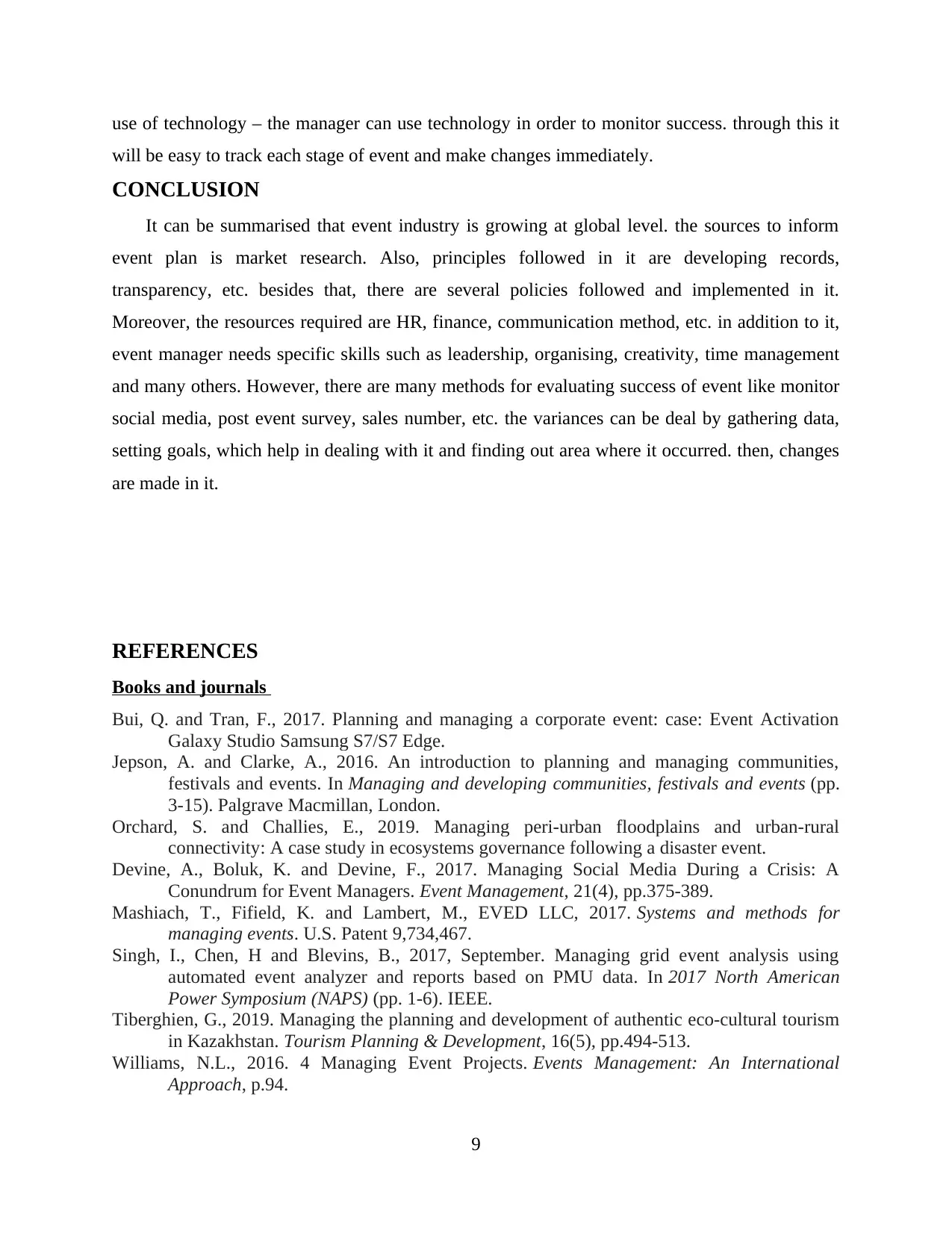
use of technology – the manager can use technology in order to monitor success. through this it
will be easy to track each stage of event and make changes immediately.
CONCLUSION
It can be summarised that event industry is growing at global level. the sources to inform
event plan is market research. Also, principles followed in it are developing records,
transparency, etc. besides that, there are several policies followed and implemented in it.
Moreover, the resources required are HR, finance, communication method, etc. in addition to it,
event manager needs specific skills such as leadership, organising, creativity, time management
and many others. However, there are many methods for evaluating success of event like monitor
social media, post event survey, sales number, etc. the variances can be deal by gathering data,
setting goals, which help in dealing with it and finding out area where it occurred. then, changes
are made in it.
REFERENCES
Books and journals
Bui, Q. and Tran, F., 2017. Planning and managing a corporate event: case: Event Activation
Galaxy Studio Samsung S7/S7 Edge.
Jepson, A. and Clarke, A., 2016. An introduction to planning and managing communities,
festivals and events. In Managing and developing communities, festivals and events (pp.
3-15). Palgrave Macmillan, London.
Orchard, S. and Challies, E., 2019. Managing peri-urban floodplains and urban-rural
connectivity: A case study in ecosystems governance following a disaster event.
Devine, A., Boluk, K. and Devine, F., 2017. Managing Social Media During a Crisis: A
Conundrum for Event Managers. Event Management, 21(4), pp.375-389.
Mashiach, T., Fifield, K. and Lambert, M., EVED LLC, 2017. Systems and methods for
managing events. U.S. Patent 9,734,467.
Singh, I., Chen, H and Blevins, B., 2017, September. Managing grid event analysis using
automated event analyzer and reports based on PMU data. In 2017 North American
Power Symposium (NAPS) (pp. 1-6). IEEE.
Tiberghien, G., 2019. Managing the planning and development of authentic eco-cultural tourism
in Kazakhstan. Tourism Planning & Development, 16(5), pp.494-513.
Williams, N.L., 2016. 4 Managing Event Projects. Events Management: An International
Approach, p.94.
9
will be easy to track each stage of event and make changes immediately.
CONCLUSION
It can be summarised that event industry is growing at global level. the sources to inform
event plan is market research. Also, principles followed in it are developing records,
transparency, etc. besides that, there are several policies followed and implemented in it.
Moreover, the resources required are HR, finance, communication method, etc. in addition to it,
event manager needs specific skills such as leadership, organising, creativity, time management
and many others. However, there are many methods for evaluating success of event like monitor
social media, post event survey, sales number, etc. the variances can be deal by gathering data,
setting goals, which help in dealing with it and finding out area where it occurred. then, changes
are made in it.
REFERENCES
Books and journals
Bui, Q. and Tran, F., 2017. Planning and managing a corporate event: case: Event Activation
Galaxy Studio Samsung S7/S7 Edge.
Jepson, A. and Clarke, A., 2016. An introduction to planning and managing communities,
festivals and events. In Managing and developing communities, festivals and events (pp.
3-15). Palgrave Macmillan, London.
Orchard, S. and Challies, E., 2019. Managing peri-urban floodplains and urban-rural
connectivity: A case study in ecosystems governance following a disaster event.
Devine, A., Boluk, K. and Devine, F., 2017. Managing Social Media During a Crisis: A
Conundrum for Event Managers. Event Management, 21(4), pp.375-389.
Mashiach, T., Fifield, K. and Lambert, M., EVED LLC, 2017. Systems and methods for
managing events. U.S. Patent 9,734,467.
Singh, I., Chen, H and Blevins, B., 2017, September. Managing grid event analysis using
automated event analyzer and reports based on PMU data. In 2017 North American
Power Symposium (NAPS) (pp. 1-6). IEEE.
Tiberghien, G., 2019. Managing the planning and development of authentic eco-cultural tourism
in Kazakhstan. Tourism Planning & Development, 16(5), pp.494-513.
Williams, N.L., 2016. 4 Managing Event Projects. Events Management: An International
Approach, p.94.
9
⊘ This is a preview!⊘
Do you want full access?
Subscribe today to unlock all pages.

Trusted by 1+ million students worldwide
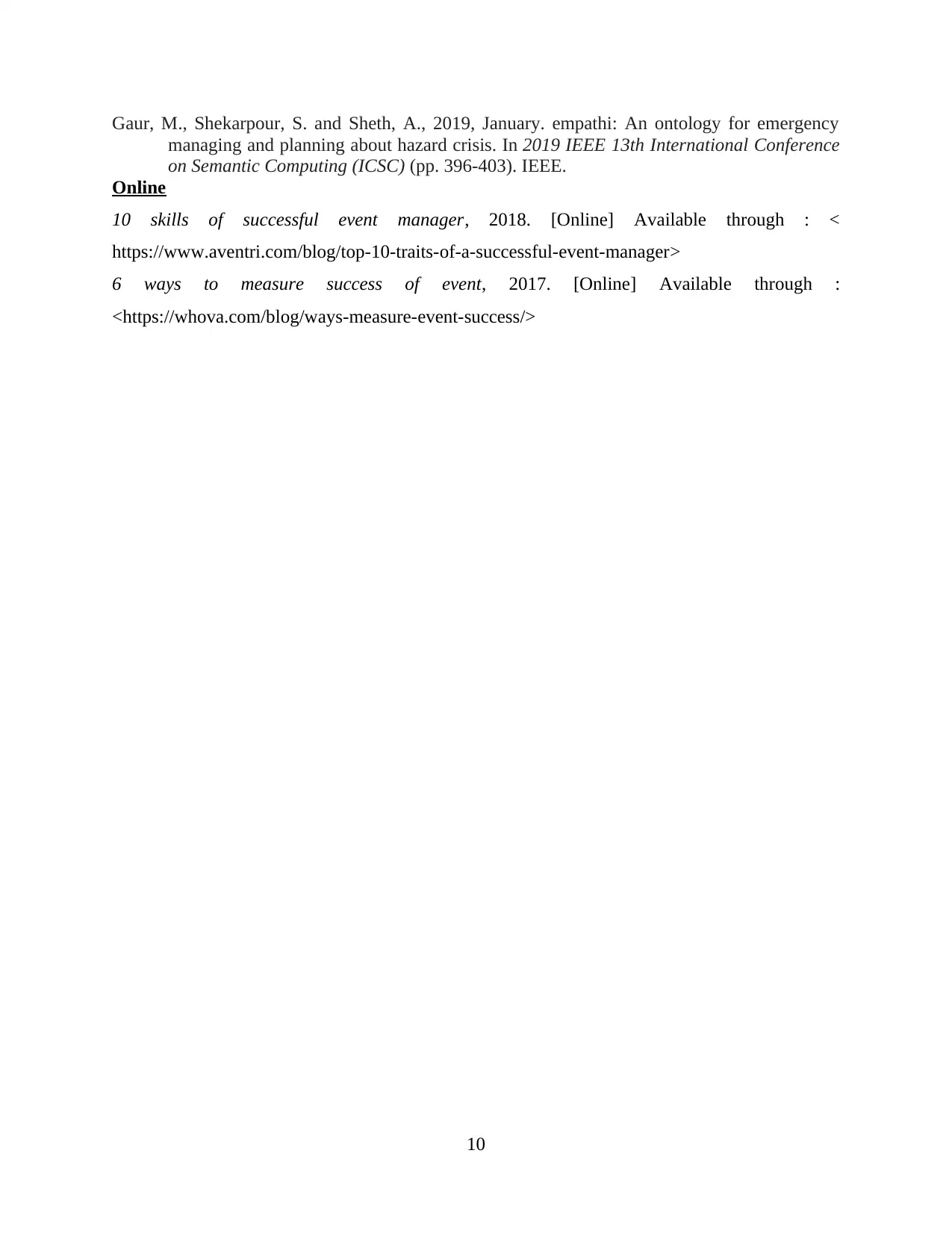
Gaur, M., Shekarpour, S. and Sheth, A., 2019, January. empathi: An ontology for emergency
managing and planning about hazard crisis. In 2019 IEEE 13th International Conference
on Semantic Computing (ICSC) (pp. 396-403). IEEE.
Online
10 skills of successful event manager, 2018. [Online] Available through : <
https://www.aventri.com/blog/top-10-traits-of-a-successful-event-manager>
6 ways to measure success of event, 2017. [Online] Available through :
<https://whova.com/blog/ways-measure-event-success/>
10
managing and planning about hazard crisis. In 2019 IEEE 13th International Conference
on Semantic Computing (ICSC) (pp. 396-403). IEEE.
Online
10 skills of successful event manager, 2018. [Online] Available through : <
https://www.aventri.com/blog/top-10-traits-of-a-successful-event-manager>
6 ways to measure success of event, 2017. [Online] Available through :
<https://whova.com/blog/ways-measure-event-success/>
10
1 out of 10
Related Documents
Your All-in-One AI-Powered Toolkit for Academic Success.
+13062052269
info@desklib.com
Available 24*7 on WhatsApp / Email
![[object Object]](/_next/static/media/star-bottom.7253800d.svg)
Unlock your academic potential
Copyright © 2020–2025 A2Z Services. All Rights Reserved. Developed and managed by ZUCOL.





